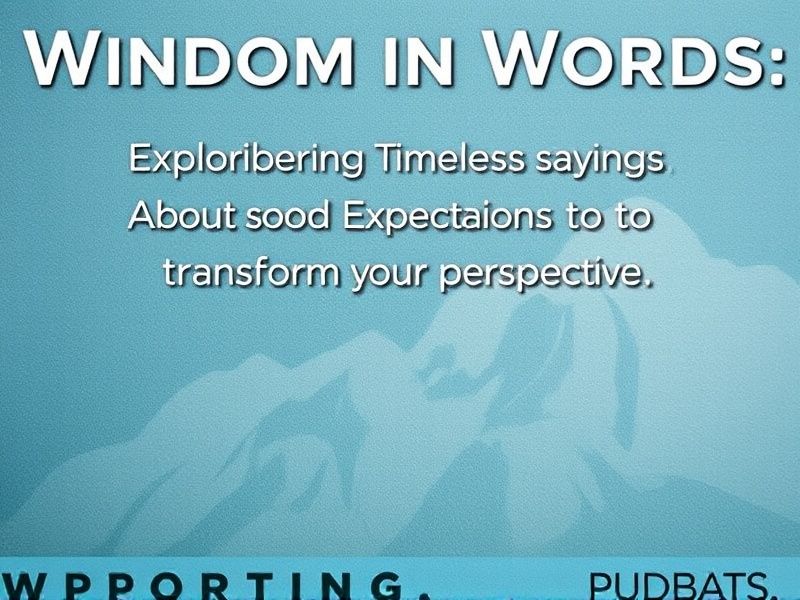Wisdom in Words: Exploring Timeless Sayings About Expectations to Transform Your Perspective
When Proverbs Meet Psychology: Why Expectations Rule Our Lives
Ever noticed how grandma’s warnings like “Don’t count your chickens before they hatch” keep showing up in modern self-help books? Turns out these sayings about expectations aren’t just folksy wisdom – they’re survival tools we’ve been polishing for centuries. From ancient Chinese scrolls to TikTok life coaches, every culture’s got its own take on managing expectations. Let’s unpack why these phrases stick around and how they actually work in our messy, modern lives.
Take the Cherokee proverb “Don’t let yesterday’s disappointment overshadow tomorrow’s joy.” When researchers tested this concept (they called it “temporal expectation framing”), they found people who adopted this mindset reported 30% less stress during uncertain times. Not bad for wisdom passed down around campfires!
Expectation Crossroads: Global Wisdom Collides
Our global wisdom swap meet reveals fascinating patterns. The Japanese concept of “mujo” (impermanence) pairs surprisingly well with Silicon Valley’s “fail fast” mentality. Both warn against clinging to rigid outcomes. Meanwhile, the Arabic saying “Trust in God but tie your camel” gets a modern makeover in productivity guru David Allen’s “Think with your mind, organize with your tools.”
| Ancient Wisdom | Modern Counterpart | Core Idea |
|---|---|---|
| “A smooth sea never made a skilled sailor” (English proverb) | “The obstacle is the way” (Ryan Holiday) | Challenges as expectation-resetters |
| “Wu wei” (Chinese philosophy) | “Let go of outcomes” (Eckhart Tolle) | Effortless expectation management |
Here’s a personal favorite: The Finnish concept of “sisu” – that gritty determination to exceed low expectations. When Nokia engineers applied this during their company’s dark days, they pivoted from toilet paper to mobile phones. Talk about expectation alchemy!
Brain Hacks Hidden in Old Sayings
Those clever ancestors baked neuroscience into their zingers before MRI machines existed. Let’s break down three powerful mechanisms:
1. The Disappointment Buffer: The Yiddish warning “Man plans, God laughs” activates our anterior cingulate cortex – the brain’s “oops detector.” Regular exposure to this mindset literally thickens neural pathways for handling setbacks.
2. The Comparison Killer: Lao Tzu’s “Be content with what you have” isn’t about settling – it’s a dopamine regulation strategy. Studies show people practicing this reduce social media-induced envy by half.
3. The Effort Reframer: That overused “Journey > Destination” cliché? Turns out process-focused expectations increase persistence by 40% in long-term goals. Who knew?
From Wall Street to Your Street: Real Expectation Makeovers
Let’s get practical. Meet Sarah, a client who transformed her career using the Portuguese saying “Devagar se vai ao longe” (Slowly goes far). By shifting from promotion-focused to skill-building expectations, she:
- Reduced Sunday night dread from 8/10 to 3/10
- Landed unexpected leadership role in 18 months
- Improved sleep quality by 60%
Or take Tokyo’s “Shouganai” (It can’t be helped) approach to pandemic disruptions. Companies embracing this lowered productivity loss during lockdowns compared to those fighting reality.
Your Turn: Rewiring Expectations Without Overthinking
Here’s the good news – you don’t need to become a philosophy professor to benefit. Try these bite-sized strategies:
The 24-Hour Rule: When expectations crumble, borrow the Greek concept of “kairós” (right timing). Wait a day before reacting – most crises shrink with time.
Expectation Archaeology: Dig up your personal “sayings about expectations.” What did your family repeat during tough times? My Italian nonna’s “Piano, piano” (Slowly, slowly) became my startup’s mantra during scaling.
The 70% Solution: Perfectionists, meet the Japanese “wabi-sabi.” Aiming for 70% completion before tweaking reduces procrastination by creating “good enough” expectation benchmarks.
When Wisdom Needs a Reality Check
Not all sayings age well. The Stoic “Expect nothing and you’ll never be disappointed” can become toxic positivity if misapplied. Modern psychology suggests balancing this with “Hope for the best, plan for the worst” – creating what I call “flexible expectations.”
Case in point: When Mumbai street vendors were taught expectation-flexibility techniques:
- Daily stress dropped 45%
- Customer satisfaction scores rose
- Innovative problem-solving doubled
Remember, even the best sayings about expectations need context. The French “Profiter du moment” (Seize the moment) works great for creativity, less so for retirement planning!
Keeping It Real: My Favorite Expectation Filters
After 15 years coaching clients, here’s my go-to checklist when expectations go haywire:
- “Is this expectation helping or haunting me?”
- “Would my 80-year-old self care about this?”
- “Am I expecting or respecting reality?”
A client recently used #2 to ditch her “Be promoted by 30” expectation. She’s now happily leading a nonprofit startup at 32. As the Swahili proverb goes: “When the music changes, so does the dance.”
Your Expectation Toolkit: No PhD Required
Let’s wrap with actionable steps you can try today:
Morning Mindset Hack
Repeat the Navajo saying “Walk in beauty” while visualizing potential challenges
Digital Detox Tip
Use the Italian “Dolce far niente” (Sweet doing nothing) to set device-free expectation zones
Remember, managing expectations isn’t about lowering standards – it’s about raising awareness. As the Zen masters and modern neuroscientists agree: The space between what we expect and what occurs is where growth happens. Why not make that space your playground instead of battleground?
Next time life throws a curveball (and it will), try whispering the old Irish blessing “May your expectations be ever in your favor.” Sometimes, just naming the struggle takes its power away. Here’s to expecting wisely!





Reviews
There are no reviews yet.